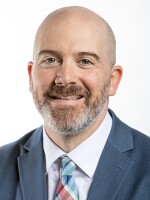ROBERT SIEGEL, HOST:
It's been more than a month since automatic federal budget cuts kicked in and many warnings have been issued about how the cuts could hurt federal contractors. But in Greensboro, North Carolina, a center for aviation companies, sequestration does not seem to be having much of an impact. As Jeff Tiberii of North Carolina Public Radio reports, the companies are flush with work.
JEFF TIBERII, BYLINE: A Boeing 737 passenger jet sits naked inside an airplane hangar. The seats and windows are gone.
The roof is taken off one piece at a time.
A dozen workers resemble hungry ants as they crawl on top of and inside the jet. There is staccato hammering, dentist-like drilling and a manufacturing symphony that won't stop for almost a month.
KIP BLAKELY: For the 26 days it's here, there will be people on this aircraft 24 hours a day, seven days a week.
TIBERII: Kip Blakely is a vice president with TIMCO. Every six years, airplanes need to be overhauled. From nose to tail, they're stripped down, refurbished and put back together. TIMCO has contracts with domestic airlines to service the planes. Each year, the company makes tens of millions of dollars from this maintenance.
BLAKELY: We can design the aircraft interior. We can manufacture the seats, the lavatories, the galleys. We can install them. We can certify them and then maintain them for the life of that aircraft.
TIBERII: It's an efficient operation. Once the work on this plane is done, another aircraft is waiting outside for its 26-day overhaul. The hangar is never empty for more than a couple hours. TIMCO also has contracts with cargo airlines as well as the Air Force and Coast Guard. Blakely says there's enough business coming in that any concern over the budget cuts and losing military work is nonexistent.
BLAKELY: It's geopolitical issues like in North Korea or war or an outbreak that could affect the airline industry, and that's what we're watching more for than just the day-to-day politics of Washington.
TIBERII: Aviation analysts agree. Richard Aboulafia works for the Washington, D.C.-based Teal Group. He says there's a divide between Washington's politicians and business outside the Beltway.
RICHARD ABOULAFIA: There are good reasons to be concerned about government spending, but the greater economic recovery, largely led by the commercial sector, is gathering steam. I think there might have been just this great disconnect about the overall impact of government funding on the economy.
TIBERII: Aboulafia calls this the strongest manufacturing industry in the country. The jetliner market is a $90 billion a year industry. Aviation giants Boeing and Airbus grew by double digits last year. In North Carolina, TIMCO added dozens of new employees in January. Other firms here are expanding too.
In Kernersville, Piedmont Aviation Component Services has outgrown its space. Workers were moving equipment a few days ago from one building into a new facility.
TODD SCHWARZ: With the cycles and with the needs for maintenance on aircraft, you can't put it off for so long. There's a certain amount of work that's out there that has to be done.
TIBERII: Todd Schwarz is the president of Piedmont Aviation. The company does routine maintenance on landing gear, propellers and auxiliary power units. He doesn't think the political posturing and budget cutbacks will ultimately affect Piedmont's bottom line.
SCHWARZ: I think the economy is improving. It's a slow improvement, but I think we're on the right trajectory. And, you know, I'm confident that this is sustainable, and, you know, we'll continue this for a few years.
TIBERII: Piedmont isn't the only aviation company expanding here. TIMCO is at capacity and turning away business. The company plans to build two new hangars and add 400 jobs. With the stock market rising and unemployment falling, the company isn't worried about furloughs, cutbacks or any budget talk coming out of Washington. For NPR News, I'm Jeff Tiberii in Greensboro, North Carolina. Transcript provided by NPR, Copyright NPR.


